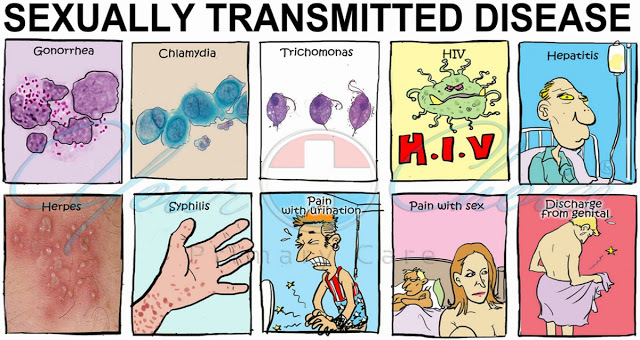STD Overview: Getting Tested for STD and STI
Overview of STD- What STD Test Is Right for You
STDs, also known as sexually transmitted infections (STIs), are typically caused by bacteria or viruses and are passed from person to person during sexual contact with the penis, vagina, anus, or mouth. The symptoms of STDs/STIs vary between individuals, depending on the cause, and many people may not experience symptoms at all.STIs can also increase the risk of getting and transmitting HIV/AIDS and alter the way the disease progresses. STIs can also cause long-term health problems, particularly in women and infants. STDs don't always cause symptoms. It's possible to contract sexually transmitted diseases from people who seem perfectly healthy and may not even know they have an infection.
People with STDs/STIs may feel ill and notice some of the following common signs and symptoms:
 |
| Photo Credit: Mapolytrends |
- Unusual discharge from the penis or vagina
- Sores or warts on the genital area
- Painful or frequent urination
- Fever
- Itching and redness in the genital area
- Blisters or sores in or around the mouth
- Abnormal vaginal odor
- Anal itching, soreness, or bleeding
- Abdominal pain
- Pain during sex
If you feel the sign and symptoms, see a doctor immediately for treatments and medication.
STD Testing: What's right for you?
There are different tests for different sexually transmitted diseases (STDs). The kind of test a person gets will depend on the type of STD, symptoms (like sores, discharge, or pain), and his or her medical and sexual history.If you've had unprotected sex, have a new partner (or more than one partner), or for any reason you are worried you have been exposed to an STI, talk to your healthcare provider about getting tested be tested for these leading common STIs.
Some of the following diseases, such as hepatitis, can also be transmitted without sexual contact, by coming into contact with an infected person's blood. Others, such as gonorrhea, can only be transmitted through sexual contact. These "hidden" STDs can still put people at risk for health problems.
What STD can be tested for?
- chlamydia
- gonorrhea
- hepatitis
- herpes
- HIV
- syphilis
Procedure on how to get tested for STD/STI
- a blood sample (from either a blood draw or a finger prick).
- a urine sample.
- a swab of the inside of the mouth.
- a swab from the genitals, such as the urethra in guys or the cervix in girls.
- a swab of any discharge or sores.


Comments
Post a Comment